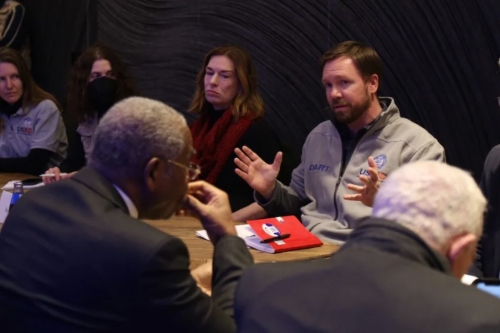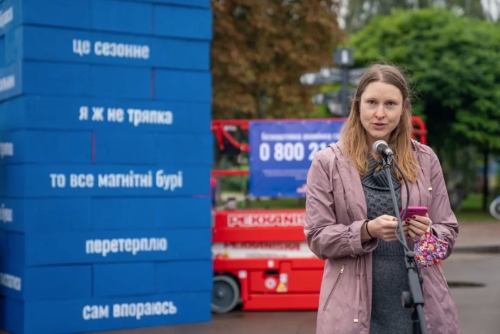
Feds aiding Ukrainians displaced by war describe a ‘heartbreaking’ effort: ‘It’s personal’
By Joe Davidson featuring Stephen Allen, Fletcher Alumnus.
A friend once told Stephen Allen there’s “nothing more tragic than a cynical humanitarian.”
A veteran international aid worker with the U.S. Agency for International Development, Allen said he guards against cynicism, including that fostered by “the deliberate infliction of pain,” by ensuring “that people who need assistance are getting that assistance.”
But Russian President Vladimir Putin’s deliberate infliction of pain in Ukraine makes Allen’s job very difficult. Allen is the USAID Disaster Assistance Response Team (DART) leader for Ukraine, temporarily posted in Rzeszów, Poland, about 90 minutes from Ukraine’s border.
The DART program helps displaced people inside Ukraine, while the State Department’s Bureau of Population, Refugees and Migration coordinates programs for Ukrainian refugees who have fled their homeland.
More than 3.6 million refugees have escaped Ukraine since Russia’s invasion began on Feb. 24, according to the United Nations. More than 6.5 million are internally displaced. The U.S. government has provided more than $292 million in humanitarian funding related to Ukraine this fiscal year. The assistance includes 18,500 thermal blankets, emergency health kits to serve 100,000 people for three months; trauma and emergency surgery kits for 500 operations; and food, water, sanitation and hygiene supplies for thousands.
“A big part of our effort,” Allen said, “is just making sure that the U.S. funding is getting where it needs to go.”
Normally, Allen, a 39-year-old from Greenville, S.C., is based in Budapest, but he’s now in Poland to better serve victims of the war. He has worked in Syria, where he saw similarly horrific military tactics against civilian targets. With USAID since 2016, Allen is “very, very pleased” with how quickly his team was able to get 516 metric tons of supplies into Ukraine, including into cities withheavy fighting like Sumy and Kharkiv, from warehouses as far away as Dubai.
But critical assistance is not getting everywhere it needs to be — a point of frustration for Allen and his team — particularly as they witness the annihilation of Mariupol, the southeastern port city that has been pummeledby Russian forces.

“We have a system that could get into Mariupol,” Allen said by phone. “We have worked with the U.N. and with others to pre-position supplies within Ukraine.”
But it’s too dangerous to get those supplies into the city under siege. On Tuesday, Ukrainian officials said the Russians seized a humanitarian convoy and captured its workers. Having the supplies available, but unable to provide them where needed, “it’s heartbreaking,” Allen added. “It’s incredibly frustrating to watch that happen.”
“Heartbreaking” — that’sthe same word another federal employee used, in a separate video call, to describe “the sheer destruction that the Russian government is bringing upon Ukraine.”
For Renee Lariviere, her heart breaks twice — for Ukraine and the Russia she knew.
Previously, Lariviere was a State Department intern in Moscow and studied in St. Petersburg, Russia’s cultural heart. Putin’s actions inflame her heartbreak “because I loved my time in Russia,” she said. “The country is beautiful, the history, the culture. People were kind on the streets, and they wanted me to learn more about their country.”
Now, she is the regional refugee coordinator for the State Department’s Bureau of Population, Refugees and Migration, working temporarily in Warsaw after she and other U.S. government personnel fled Kyiv, Ukraine’s capital, shortly before Russia invaded. She had to leave an apartment filled with important belongings that would not fit in two suitcases.
Among those items is a yellow afghan blanket her great-grandmother knitted and “has always been on my bed,” she said. Also relinquished were Lariviere’s holiday ornaments, collected as souvenirs during her travels, “so that every year I can open a box and think of the memories associated with each ornament. Those are things that are truly irreplaceable.” She was able to ship Emmitt, her 10-year-old sheltie, a “fearless, four-legged family member,” to relatives in the states.
Lariviere, a 36-year-old Foreign Service officer from Richford, Vt., coordinates refugee assistance in a variety of ways. On Tuesday, for example, she researched information on the availability of drug treatment for refugees outside of Ukraine. “We quickly determined that refugees do have access to those systems” in Poland, she said, while “ensuring that U.S. taxpayer funds are used responsibly and do not duplicate existing programs.”

She also works with humanitarian agencies to ensure that unaccompanied refugee children are cared for and safe. “We want to facilitate family reunification whenever possible,” Lariviere said, with “a coordinated, holistic approach on policy supporting children’s protection.”
Unlike Ukrainians who have lost everything in the war, Lariviere’s personal situation is not dire. But their fight is her fight. “I hope to keep fighting for the protection of Ukrainians,” she said. “It’s personal.”
It’s personal because she considered Kyiv home, at least until her tour there ends. That’s scheduled for August 2023, but Lariviere doesn’t know when — or if — she will return.
“It is personal because local colleagues I worked with every day are being forced to flee for their own safety, or that of their children,” she explained by email. “It is personal because my language tutor and her child had to take shelter to hide from air assaults. It is personal because I don’t know the fate of so many people who I lived with and saw daily, without knowing how to contact them to see if they are okay — the staff who worked at my building and were always quick to wave hello, the dog-owners in my neighborhood who were on the [same] walking schedule as me and my pup, the teenagers who partied WAY too loudly behind my apartment complex, but were always so polite when I needed to wade through the crowd to pick up delivery food.”
She did see her Kyiv apartment building on CNN. It was not damaged at that time, but she doesn’t know how long her neighbors can remain there.
“I considered Kyiv my home temporarily, but it was their permanent home and it is being torn away from them,” Lariviere added. “If I can help advocate for their access to shelter, services, education, and livelihood for as long as they may be outside of Ukraine, it is the least I can do to give back to a community that made me feel so welcome outside my country.”
This piece is republished from The Washington Post.
